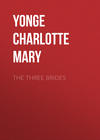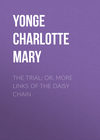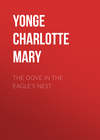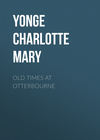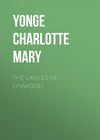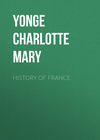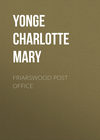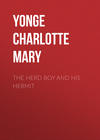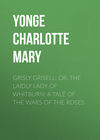Buch lesen: «The Three Brides», Seite 11
CHAPTER XV
Plot and Counterplot
A lady a party of pleasure made,
And she planned her scheme full well,
And day and night the party filled
The head of the demoiselle.
—FABER
Though Frank had no reason to expect that the tidings of his success would be hailed with much satisfaction at home, yet his habit of turning to his mother for sympathy would have been too much for his prudence, but for the fact that Terry De Lancey had dragged into her room a massive volume of prints from the Uffizi Gallery, and was looking it over with her, with a zest she had not seen since the days when her father gloried in his collection.
His victory could only be confided to Charlie, who might laugh, but fully appreciated the repose of mind with which he could now encounter the examiners, and promised to do his part to cover the meetings of the lovers the next day. But even then the chances of another performance on the lake, or of a walk among the icicles afterwards, were departing. Thaw was setting in and by breakfast-time there was a down-pouring rain. Frank lingered about Cecil in hopes of a message to serve as an excuse for a rush to Sirenwood; but she proved to be going to drive to the working-room, and then to lunch at Mrs. Duncombe’s, to meet the Americans and the ladies from Sirenwood, according to a note sent over in early morning at first sight of the wet.
Thereupon Frank found he had a last reference to make to his tutor, and begged for a lift. A touch of warmth in Cecil would have opened the flood-gates of his confidence, but she was exercised about a mistake in the accounts, and claimed his aid in tracking a defective seven-pence. When she heard him utter the monstrous statement that a hundred and five farthings were almost nine shillings, she looked at him with withering compassion, as sure to fail, and a small loss to Her Majesty; nor would she listen to any of his hints that he was very curious to see her working-room.
His question to the tutor judiciously lasted till twelve, when he dropped in to consult Captain Duncombe about horse-hire in London; and that gentleman, who had been undergoing a course of political economy all the morning, eagerly pounced on him for a tour of his stables, which lasted till luncheon was due, and he could casually enter the dining-room, where Lady Tyrrell held out her hand good-naturedly to him, laughing at the blankness he could not entirely conceal. “Only me!” she said. “It can’t be helped! Poor Lenore caught such a dreadful sore throat last night, that I have shut her up in her room with a mustard poultice.”
“Indeed! I am very sorry.”
“You may well look horrified! You were the guilty party, I suspect. Taking her all across the park under those dank trees!”
He coloured up to the eyes, little expecting to be thus convicted; but Mrs. Duncombe came to his aid. “My impartiality would impute the damage to her standing about with those wretched little dogs of mine.”
“It is your climate,” said Mrs. Tallboys. “In our dry atmosphere there would be no risk with a far lower temperature.”
“I hope it is nothing serious,” said Frank, anxiously.
“I hope so too,” said Lady Tyrrell, looking archly into his face, which had not learnt such impenetrability as poor Lenore’s.
“No; but really?” he said, in anxiety that would not be rallied away.
“This is the way,” said Lady Tyrrell. “Young gentlemen persuade young ladies to do the most imprudent things—saunter about in the cold after skating, and dawdle under trees, and then wonder when they catch cold.—Do they do such things in your country, Mrs. Tallboys, and expect the mammas and elder sisters to be gratified?”
“Mammas and elder sisters are at a discount with you, are not they?” said Mrs. Duncombe.
“Our young women are sufficient to protect themselves without our showing tacit distrust, and encumbering them with guardianship,” returned the Professor.
“Mr. Charnock wishes we had reached that point,” said Lady Tyrrell.
She had put him completely out of countenance. He had not supposed her aware of his having been Lenore’s companion, and was not certain whether her sister had not after all confided in her, or if he himself had not been an unconscious victim. The public banter jarred upon him; and while Cecil was making inquiries into the extent of the young ladies’ privileges in America, he was mentally calculating the possibilities of rushing up to Sirenwood, trying to see Lenore in spite of her throat, and ascertaining her position, before his train was due; but he was forced to resign the notion, for Raymond had made an appointment for him in London which must not be missed; and before luncheon was over the dog-cart, according to agreement with Charlie, called for him.
“Good-bye, Mr. Frank,” said Mrs. Duncombe; “will you have an old shoe thrown after you for luck?”
“The time is not come for that yet,” said Cecil, gravely.
“Tending in that direction. Eh, Charnock?” said the Captain. “Here’s to your success—now, and in what’s to come!”
“Thank you, Captain,” said Frank, shaking his hand, liking the hearty voice. “Lady Tyrrell, won’t you give me your good wishes?” he asked, half diffidently.
“For the examination—yes, certainly,” she replied. “It is safer not to look too far into your wishing-well.”
“And—and will you give my—my best regards to Le—to Miss Vivian, and say I grieve for her cold, and trust to her—to her good wishes—” he uttered, quick and fast, holding her hand all the time.
“Yes, yes,” she said quickly; “but last messages won’t do when trains are due.”
“Not due yet,” said Frank; “but I must go home. I’ve not seen my mother to-day, and I shall not have a moment.—Good-bye, Cecil; have you any commands for Raymond?”
“No, thank you,” said Cecil, gravely; and with a bow to the Americans, he was gone.
“That is one of your products of the highest English refinement?” said Mrs. Tallboys, whom in his preoccupation he had scarcely noticed.
“How does he strike you?” said Cecil. “He is my brother-in-law, but never mind that.”
“He looks fitted for the hero of a vapid English novel. I long to force him to rough it, and to rub off that exquisite do-nothing air. It irritates me!”
“Frank Charnock has done a good deal of hard work, and is not to lead the life of an idle man,” said Captain Duncombe. “I know I should not like to be in his shoes if he succeeds—grinding away in an office ten months out of the twelve.”
“In an office! I should like to set him to work with an axe!”
“Well, those dainty-looking curled darlings don’t do badly in the backwoods,” said Lady Tyrrell.
“Ah! I understand! You stand up for him because there’s a little tendresse for your sister,” said the plain-spoken American.
“Poor fellow! I am afraid he is far gone. It is an impossible thing, though, and the sooner he can be cured of it the better,” said Lady Tyrrell. “I am sorry that walk took place yesterday.—Did he mention it at home, Cecil?”
“You are a very inconsistent woman, Lady Tyrrell,” broke in Mrs. Duncombe in her abrupt way. “Here you are come to uphold the emancipation of woman, and yet, when we come to your own sister taking one poor walk—”
“I beg your pardon, Bessie,” said Lady Tyrrell, with her most courteous manner. “I never said I was come to uphold the emancipation of woman; only to subject myself to Mrs. Tallboys’ influence—she has to make a convert of me.”
For, of course, Lady Tyrrell was only drawn into the controversy as a matter of amusement, and possibly as something specially distasteful to the house of Charnock Poynsett; and Cecil was a good deal influenced by the fascination of her example, as well as by the eagerness of Mrs. Duncombe and the charms of the Americans; and above all, they conspired in making her feel herself important, and assuming that she must be foremost in all that was done. She did not controvert the doctrines of Dunstone so entirely as to embrace the doctrines of emancipation, but she thought that free ventilation was due to every subject, most especially when the Member’s wife was the leading lady in bringing about such discussion. The opposition made in the town to Mrs. Duncombe’s sanitary plans, and the contempt with which they had been treated as ladies’ fancies, had given a positive field of battle, with that admixture of right and wrong on either side which is essential to championship. And in truth Cecil was so much more under the influence of Camilla Tyrrell and Bessie Duncombe than under that of any other person, that she was ready to espouse any cause that they did.
How to arrange for the intended instruction was the difficulty, since Wil’sbro’ was without a town-hall, and, moreover, the inhabitants were averse to all varieties of change, either as to the claims of women, the inequality of social laws, the improvement of education, or the comprehension of social science—the regular course which Mrs. Clio W. Tallboys was wont to lecture.
The matter could only be managed by arranging a series of soirées at different houses. Mrs. Duncombe’s rooms were far too small; but if some person of more note—‘some swell’ as she said—would make the beginning, there would be no difficulty in bringing others to follow suit.
“You must do it, Lady Tyrrell,” said Mrs. Duncombe.
“I! If there’s nobody else; but it would come much better from another quarter,” nodding at Cecil.
“Don’t you wish you may get it?” muttered the slang-loving Bessie.
“That’s one point in which we leave you far behind,” said Mrs. Tallboys. “We issue our invitations quite independently of the other members of the household. Each has a separate visiting list.”
“There need be no difficulty,” said Cecil; “all matters of visiting are in my hands. It is necessary in our position; and if Lady Tyrrell thinks it proper that I should give the first party, I will do so.”
“Bravo, what fun!” cried Mrs. Duncombe, clapping her hands. “You won’t get into a jolly row, though?” she added, anxiously.
“I am perfectly sure of my ground,” said Cecil, with the dignity of one to whom a ‘row’ was unheard of. “It is the simple duty of a Member to come forward in promoting free discussion of opinions.”
“You are a public-spirited woman, Cecil,” said Lady Tyrrell. “When you have made the first move, I’ll follow. Then whom shall we ask next?”
“Mrs. Moy,” said Bessie. “She is a nonentity herself, but if Gussie were to be strongly bitten she could do more than any one else, and make her father reform that nest of horrors in Water Lane!”
“I’m afraid the freedom side will bite her more than the sanitary side,” said Lady Tyrrell.
“She is capital fun, though, and a great ally of ours,” said Mrs. Duncombe; “and the rooms at Proudfoot Lawn are worth anything!”
Other details were fixed, even to the day of Cecil’s opening party, which must take place on the first practicable day; but there was none to be found till the Wednesday week, the day before Raymond would return home. Cecil did not recollect this till the day had been unanimously agreed on, and it was with a little alarm; but after what she had asserted about her freedom of action, she could not retract before the eyes of the American lady; and, as she said to herself, she could receive her own ladies’ party, without interfering with any one else, in the library, so that no one had a right to object. However, she had a certain anticipation of opposition, which caused her to act before announcing her intention; and thus it was that Rosamond found her dropping a number of notes through the slit in the lid of the post-box. “Another dinner?” was the question.
“No, this is a soirée in the library, entirely for ladies; Mrs. Tallboys is to explain her views in the evenings at the Principal houses in the neighbourhood. She will begin here on Wednesday week.”
“Why, that’s before Raymond comes back!”
“This is entirely for women.”
“Women! women’s rights! How have you got Mrs. Poynsett to consent?”
“I have carte blanche in these matters.”
“Do you mean that you have not consulted her? Does Raymond know? Oh! Yes, I see I have no right to ask; but, Cecil, for your own sake, I entreat you to consider what you are about, before running into such a frightful scrape!” and Rosamond impulsively caught the hand that was still putting in a letter; but Cecil stood still, not withdrawing or moving a muscle, perfectly impassive. Rosamond went on more eagerly, “Oh yes, I know you don’t like me—I’m only a poor battered soldier’s daughter, quite an unworthy associate for a Charnock of the Charnocks; but I can’t help begging you to consider the consequences of sending out invitations to hear this strange woman hold forth in Mrs. Poynsett’s own house, in your husband’s absence.”
“Thank you for your solicitude,” said Cecil, dropping in her envelope the instant the obstructive hand was removed, and going on her way with dignified self-possession; while Rosamond, in a tumult of indignation, which made her scarcely comprehensible, rushed up to her husband at his writing, and poured out her story.
Clio advocating female supremacy in Mrs. Poynsett’s own house, without notice to her! Should she be warned in time to stop the letters? Should Raymond be written to? Rosamond was for both, Julius for neither. He said that either way would begin a system that could never be forgiven; and that they had better consider themselves as practically at the Rectory, and not interfere.
“How can you be so cold-blooded?” cried she.
“I do not want to do worse harm. My mother will learn what is to happen sooner or later; and then she can put a stop to it in any way she chooses.”
“I wish she would send in Mrs. Crabtree with her tawse!” said Rosamond. “But is it right by Raymond to let his wife bring this Yankee muse to talk her nonsense in his very rooms?”
“You have argued with her?”
“Or with a block—a stock—a stone!” raved Rosamond.
“Then depend upon it, to inform against her would be far worse than letting any amount of absurdity be talked. I should like to know how you would get over being so served!”
“Don’t make comparisons, sir! Poor things! they would not be the worse for a little of our foolishness!”
Things settled themselves according to Julius’s prediction; for Mr. Bowater, coming up with his son Herbert to see his old friend, said, “What grand doings are you having here? What is Raymond’s wife up to? Ladies’ conversazione—that’s a new thing in these parts!”
“I gave such matters up to her,” said Mrs. Poynsett. “Young people like a little freedom of action; and there are changes in the neighbourhood since I was laid up.” It was a temporizing speech, to avoid showing her total ignorance.
Mr. Bowater cleared his throat. “Young folk may like freedom of action, but it don’t always follow that it is good for them. I hope she won’t get Raymond into a scrape, that’s all—committing him and herself to a course of lectures by that Yankee woman on woman’s rights.”
“It does not commit him; it is before he comes home, on Wednesday,” said Herbert.
“Never mind that; what a woman does her husband does. Look here, Mrs. Poynsett, I brought over Jenny’s note in my pocket; see, here are two—one to accept, and one to refuse, just as you choose.”
“Oh! accept, by all means,” cried Mrs. Poynsett; “don’t leave the wrong one!”
Then she changed the conversation, so decidedly, that Mr. Bowater could not resume his warning; but after taking leave of her, he met Rosamond in the avenue, and could not help saying, “Pray, was my old friend aware of Mrs. Raymond’s doings?”
“Have you told her? Oh! I am so glad!”
“Then it is as you said, Herbert. Mrs. Raymond had left her in ignorance! The impudent baggage! That’s what the world is coming to!”
“But what regular game Mrs. Poynsett was!” said Herbert. “You could not make out in the least that she had been left in the lurch; and I’m sure she has a plan, by the way in which she desired Jenny and Edie to come.”
“Only make her understand that the Wil’sbro’ folks are in a ticklish state,” said Mr. Bowater; “they are sulking already, because they say the ladies have been stirring him up to put them to expense about the drains.”
“Wil’sbro’ isn’t sweet,” said Herbert.
“There’s been nothing amiss in my time,” returned his father. “Perfectly healthy in all reason! Ay! you may laugh, young folks, but I never heard of any receipt to hinder people from dying; and let well alone is a safe maxim.”
“If it be well,” said Rosamond. “However, Raymond says whatever is done must be by general consent, and that small private attempts do more harm than good.”
“He had better take care what he says. If they fancy he is in league with that ridiculous Duncombe woman against their pockets, Moy is on the watch to take advantage of it; and all the old family interest will not save his seat.”
When Rosamond reached home she found Anne beside her mother-in-law, provided with a quire of note-paper and pile of envelopes. “My dear, I want your help,” she said. “Till my accident I always had a children’s party at Christmas; and now I have so many young people to manage it for me, I think we might try again, and combine it with Cecil’s ladies’ party, on Wednesday.”
“Hurrah!” cried Rosamond. “You mean that we should have plenty of fun—and, in fact, drum out the rights of woman.”
“At any rate, present a counter attraction. You and Charlie and your brothers, with the Bowaters, might do something?”
“Trust me!” cried Rosamond. “Oh! I am so thankful to Mr. Bowater. Julius and I had our blood boiling; and I said as much or more to Cecil than woman could, but she minded me no more than the old white cockatoo; and Julius said our telling would only make more mischief.”
“He was quite right,” said his mother. “Let there not be one word of opposition, you know; only swamp it. You could get up some charades, and have something going on all the evening.”
“Trust me for that! Oh! if my darling Aileen were but here! But Tom is the very model of an actor, and Terry is grand, if only we can keep him out of the high tragedy line. King Lear is the mildest thing he condescends to!”
“Could you manage a Christmas-tree? The taking up a room beforehand is inconvenient; but I should like to offer some little substantial bait, even to the grown-up;” and her eyes twinkled merrily.
“I know a better thing,” said Rosamond; “an enchanted grove with a beneficent witch. We did it at St. Awdry’s, with bon-bons and trumpery, in a little conservatory, hardly large enough to turn round in. If I may have the key of the conservatory, I’ll manage.”
“You shall have what you please; and perhaps you would kindly go and choose the things at Backsworth. There is a very good fancy shop there.”
“Thank you, thank you! How sweet!—Now, Anne, you will see what you shall see!”
“Is there to be dancing?” asked Anne, humbly yet resolutely.
“There shall not be, my dear, if it will spoil the evening for you,” said Mrs. Poynsett.
“I promised,” said Anne.
At that moment the servants came in with the preparations for the afternoon tea, closely followed by the ever punctual Cecil.
Mrs. Poynsett asked her whether she would require the barouche on the morrow, since Rosamond and Anne would want it to go to Backsworth, to obtain requisites for a children’s entertainment to take place on Wednesday.
“Some friends of mine are coming on Wednesday,” said Cecil
“Indeed! In Raymond’s absence?”
“This is not a dinner, but a ladies’ party.”
“Then it will combine the better.”
“Certainly not,” replied Cecil. “Mine is simply intellectual—only a few intelligent women to meet Mrs. Tallboys in the library. It will be quite apart from any amusements Rosamond may like to have for the children in the drawing-room.”
“Pray, will they require nothing but this feast of reason and flow of soul?—for the housekeeper will need warning.”
“They will have dined. Nothing but coffee will be wanted.”
“For how many?”
“About twelve or fourteen, thank you. Excuse me—I have something to finish in my own room.”
They were very glad to excuse her, and the following note was concocted to serve both for those she might have invited and those she might not; and it was copied by the two daughters for all the acquaintance who had young folks in their houses. An appearance of want of unanimity was carefully avoided, and it stood thus:—
“I am desired by Mrs. Poynsett to say that the ladies’ party already proposed for the 3rd is to undergo a little expansion, and that she much hopes to see you and –, at 7 p.m., disposed for a few Christmas amusements.”
